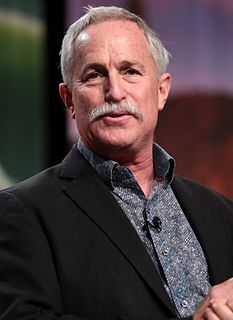A Quote by Clayton M. Christensen
Every city and town in America would be bankrupt if they kept their books the way private-sector companies keep their books - because of the obligation cities and towns have taken upon themselves to provide health care for their retirees.
Related Quotes
America must deal once and for all with an utterly irrational health care financing system that allows private interests to make billions in profits from the pain and suffering of their fellow citizens. America is the only country in the industrialized world that does not provide tax-supported universal health care coverage in some form.
From a business perspective, the question related to cities and sustainability is clear and compelling: can you have a healthy company in an unhealthy city? Arguably, no. Companies need healthy cities to provide reliable infrastructure, an educated and vital workforce, a vibrant economy, and a safe and secure environment to survive and thrive. Business executives have a lot to learn from cities, and a lot to contribute, and this book shows the way, chronicling the successes and the lessons learned about what it takes to make a city healthy, in every sense of the word.
My daughter is seven, and some of the other second-grade parents complain that their children don't read for pleasure. When I visit their homes, the children's rooms are crammed with expensive books, but the parent's rooms are empty. Those children do not see their parents reading, as I did every day of my childhood. By contrast, when I walk into an apartment with books on the shelves, books on the bedside tables, books on the floor, and books on the toilet tank, then I know what I would see if I opened the door that says 'PRIVATE--GROWNUPS KEEP OUT': a child sprawled on the bed, reading.
The books in Mo and Meggie's house were stacked under tables, on chairs, in the corners of the rooms. There where books in the kitchen and books in the lavatory. Books on the TV set and in the closet, small piles of books, tall piles of books, books thick and thin, books old and new. They welcomed Meggie down to breakfast with invitingly opened pages; they kept boredom at bay when the weather was bad. And sometimes you fall over them.
I didn't just start with ...local city officials because I knew that they would understand the problem. I started with them because I knew that our cities, towns and counties would be a key part of the solution to this issue. ...there is no one-size-fits all policy or program that can solve this problem. And Washington certainly does not have all the answers. Instead, many of the best, most innovative, most effective solutions start in our city halls and our towns and our county councils.
It's just the banks who are the latest target of the American socialist left. There is a war on the entirety of the private sector. It is the private sector that employs most of you, that services most of you, that creates the economic prosperity that our nation has enjoyed - and there is a war on that private sector, and it's being waged from the Oval Office, and its foot soldiers are on Wall Street and in other cities around the country.


































